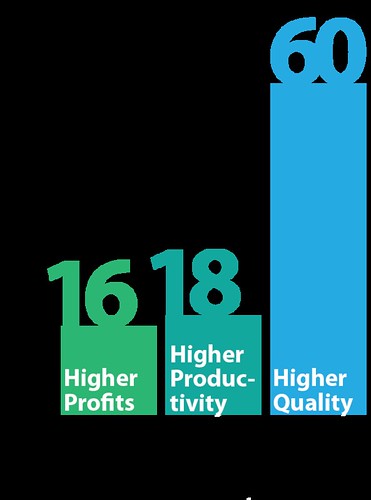I was approached recently by a large organisation to go and talk to them about ‘Engagement’. The issue that they were having was that when they put customer in front of engagement, Marketing wanted to own it. But, when they put employee in front of it then HR wanted to own it.
I tell people about this story and they smile, knowingly.
Therefore, my client wanted me to come along and share a few ideas with them about what I have seen and had learned about the connection between the two and, to, effectively, referee a wrestling match between Marketing and HR (I’m only partly kidding). However, the overall objective was to help them come up with a way of figuring out what engagement meant for their organisation and how both departments could work together on the issue.
Now, I’ve written about this before in:
- The link between customer experience and employee engagement: More art than science
- Where to start when building a great customer centric business?
- I’m confused. Why do most CEOs not get employee engagement?
But, I haven’t written about it in a while.
So, a wee while ago I saw the following article (http://blog.biworldwide.co.uk/employee-engagement—on-the-right-track.html) and it made me think a bit more about engagement. This article and the ones it refers to seem to indicate that for many organisations they look at employee engagement as a stand-alone issue. The article argues that whilst there is a lot of attention being paid to creating an engaging workplace and engaged workforces, it is being handled in isolation by HR and that clear links are not, necessarily, being made to how improved employee engagement will deliver real business benefits.
Professor Ivan Robertson, writing in The Guardian, suggests that improving peoples attitudes to work does not necessarily mean that they will be more productive, work harder or improve performance. But, data and insight from Gallup and Kenexa show the business benefits of an engaged workforce.
What’s the difference? I would bet that the organisations typified by the high performers in the Gallup and Kenexa research have made the connections, that investing in your people and your environment has to have expected dividends.
So, what does this mean? Well, I would suggest that we should not pursue employee engagement for engagement’s sake. Right? We are in business after all.
Investment in employee engagement should be conducted with expected benefits in terms of better lower staff turnover, higher customer satisfaction or repeat business or something like that.
Also, the employee engagement issue cannot just sit in the HR department. As an initiative it has to bust out of a departmental focus to become something that is an intrinsic part of the business, the planning process, expected business benefits and the targets that get set and monitored over time.
What do you think? I look forward to your thoughts and comments.





Adrian,
Thanks much for your blog. I believe that employee engagement is one of the most important, and actually, one of the most misunderstood organizational concepts. It seems that at least some companies believe that employee engagement is just a brand new "sexy” sounding term for what we have always known as employee satisfaction. Here is the blunt truth, though. Employees can be satisfied, with no real passion for the organization at all. Employees can be satisfied, but not productive…satisfied, but unaware of what the company is trying accomplish…satisfied, but completely out of touch with the customer's needs. Satisfaction is just a measure of how someone feels…it has nothing to do with what they believe in or are committed to. Engagement is something completely different. People are not just engaged…they are engaged with something or to something. In an organizational context, employee engagement means that employees believe in the mission and vision of the company and they are committed to it so much that it makes a difference in their behaviors…the way they work or the way they deal with customers.
That's the key…engagement changes minds and hearts, and it changes results because employees believe in and are committed to something. And, as you so wisely point out, the genesis of that kind of change can't just come from some sort of HR program or activity…it must come from the very soul of the organization, starting at the top and infiltrating down through the organization. Engagement comes from a systemic understanding by senior leadership that the way we treat our employees, the way that we communicate to them, the way that we listen to them, the way that we make them an active part of the organization and the way that we reward them will make a difference in our results. And, it comes from a systemic belief on the part of employees throughout the organization that they can believe those senior leaders mean what they say.
Dr. John R. Miller
http://www.pretiumsolutions.com